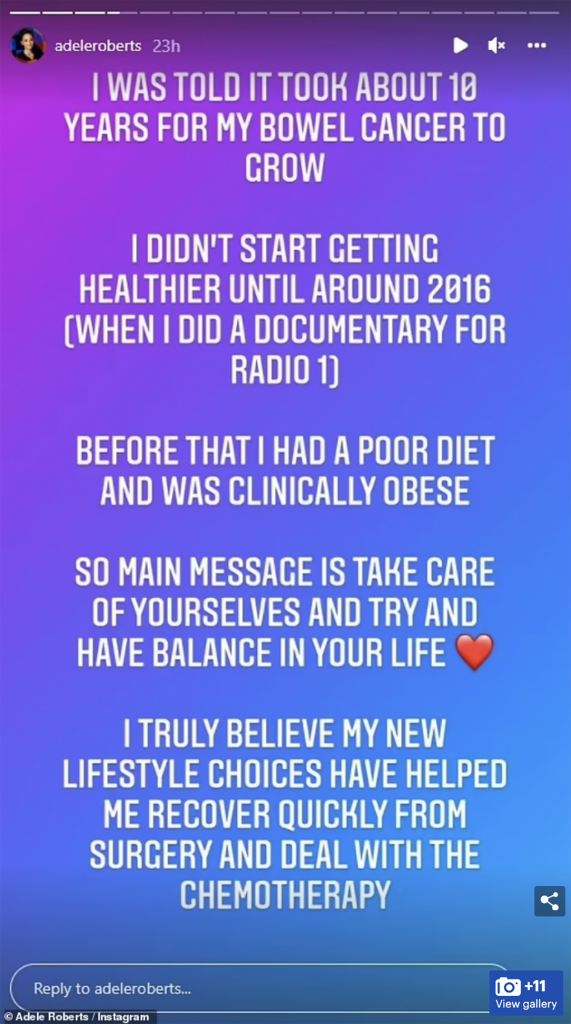Obesity & Cancer Risk
- BBC Radio 1 DJ and reality television star Adele Roberts has revealed that her bowel cancer was growing inside her for an entire decade.
- She said that just five years ago, she was "clinically obese" but decided to get in shape. Now, she is crediting her new, healthier diet and lifestyle with helping her to recover from cancer quicker.
- Obesity increases an individual's risk of developing a range of dangerous health conditions, including several types of cancer. In addition to increasing the likelihood of developing certain cancers, obesity is associated with worse treatment outcomes.
She added that just five years ago, she was "clinically obese" but decided to get in shape. Now, she is crediting her new, healthier diet and lifestyle with helping her to recover from cancer more quickly.
Read More

Adele Roberts' Bowel Cancer Diagnosis
Adele Roberts, who is best known for appearances on the UK’s Big Brother and I'm a Celebrity…Get Me Out of Here!, was diagnosed with bowel cancer in early October of last year. She found out about the disease after visiting her doctor for persistent digestive issues.She had her tumor removed, but she now sports a colostomy bag, which is also called a stoma bag. This bag is a plastic container that attaches to the front of your belly and collects waste from the intestines through an opening in the abdominal wall.
She is now undergoing chemotherapy to make sure all the cancer is gone.
View this post on Instagram
In an Instagram post announcing her diagnosis, Roberts warned her fans, "PLEASE make sure you get checked out if you have ANY concerns. The sooner you're able to see your GP or talk to someone the sooner you can get help. If I hadn't I might not be so lucky. As I've learned over the last few weeks, there's no 'normal' with cancer. Sadly it can affect anyone, at any age, anytime. It doesn't discriminate. Early detection can save your life."
Last month, Roberts did her first television interview since being diagnosed with cancer.
"It was a shock," she said live on the air. "I didn't realize I could get cancer, which I know sounds silly because I know now it can happen to anyone at any age."
She spoke with Good Morning Britain hosts about the warning that led to her diagnosis.
"My digestion started to get a bit funny," she explained, "(and) after what we ate in the jungle I wasn't surprised." (She spent time in the jungle on the British television show, I'm a Celebrity…Get Me Out of Here! On the show, a number of celebrities live together in a jungle environment.)
"I noticed when I went to the toilet things like mucus and then blood," she continued. "I didn't know whether to call the doctor because of Covid; I didn't want to bother anyone. But it got so consistent that I thought I'd better call up just in case."
Before her diagnosis, she said was "pretty much" vegetarian, she exercised, "I tried to keep fit and well and eat the right things." But, as we all know, cancer can still get you.
Obesity & Cancer Risk
While Adele Roberts was in better shape and health leading up to her bowel cancer diagnosis, she said that for years, she was “clinically obese.”
Obesity increases an individual's risk of developing a range of dangerous health conditions, including several types of cancer. In addition to increasing the likelihood of developing certain cancers, obesity is associated with worse treatment outcomes.
In a previous interview with SurvivorNet, Dr. Stephen Freedland of Cedars Sinai Medical Center said, "Some of the best data we have is that obesity increases the risk of not just getting prostate cancer, but actually dying from prostate cancer. Obese men are 35 percent more likely to die from prostate cancer."
Related: The Link Between Obesity and Prostate Cancer
While obesity or a person's high weight will not always cause them to develop cancer, other conditions associated obesity, like diabetes and heart disease, can lead to complications from cancer treatment if a person already has cancer. In addition, these conditions can sometimes prevent patients from receiving the recommended first-line therapies, as well as increase a patient's risk of undergoing surgery.
Dr. Andrea Tufano-Sugarman of NYU Langone Health explained to SurvivorNet the benefits of losing weight.
"While all cancers cannot be prevented," she said, "losing weight is a great way to reduce one's risk."
Dr. Tufano-Sugarman said that this is especially true for women; they lower their risk of developing breast cancer and endometrial cancer when they lose weight and keep it off like in Roberts’ case.
How Can Diet Affect My Cancer Risk?
Even without losing weight, adopting a more nutritious diet can help.
"Food choices, independent of weight loss, may also help to reduce risk," Dr. Tufano-Sugarman said. "Research has shown that the Mediterranean diet (rich in fruits, vegetables, nuts and legumes, fish and olive oil) is associated with a decreased risk of cancer. Whereas diets rich in red meat may be associated with an increased risk of colorectal and prostate cancer." (More on this in the next section.)
Contributing: Joe Kerwin
Learn more about SurvivorNet's rigorous medical review process.


